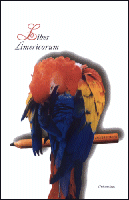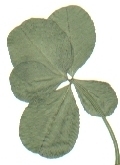
Polish Limerick Books
or: Who Really Wants to Know?
(The limerick's translation is also there.)
For those who are really limerick nuts (Yes, that's you, Arthur!), we have prepared short descriptions of Polish limerick books we could get our hands on.Liber Limericorum
Published by Universitas, Kraków, 1997
To tell you the truth, that's not really a "limerick book". The full title hopefully tells the tale:
Liber Limericorum
That Is
The Great Book Of Limericks
And Other Works
Praising Her Highness
The Queen Of The Lodge
Teresa Walas
As Well As Appropriate For Other Occasions
Written By
The Limerical Lodge Of Her AdmirersAs you can clearly see, the works published in the book are mostly limericks, but occasionally you would see a different kind of work, also non-poetic.
Besides the authors' foreword, it has a good introduction by Henryk Markiewicz, a Literature professor, and a member of Polish Academy of Science.
The introduction (entitled Discovering Limerica) quotes three limericks in English:The lion is wondrous strong
And full of the wiles of wo;
And whether he playe
Or take his preye
He cannot do but slo (= slay)
All hail to the town of Limerick
Which provides a cognomen, generic,
For a species of verse
Which for better or worse,
Is supported by layman and cleric.
There was a young lady of RigaIn the book itself there are eighty-some limericks (mostly admiring Her Highness, of course.) There is one in Czech, and one in English:
Who smiled as she rode on a tiger.
They came back from the ride
With the lady inside
And a smile on the face of the Tiger...Learned lady whom you may call Tessvincit omnia,
Used to murmur: "It's all but a mess.
Love does not
Which results in insomnia,
Every rule's to be proved, none the less."
Almost all of the limericks are heavily footnoted. For example, the footnote for the above work states that the author's mother tongue is not English, but classical Latin.
It might be an interesting excersise to feed the names of the authors into some internet search engine. The results would certainly be surprising, even for those who don't know very much about Poland in general, and Polish literature in particular. Of course, I'm not telling you what to expect. Find out for yourself. In case you'd like to do that, here are the names:
Stanisław Balbus (you can try "Stanislaw Balbus"), Jacek Baluch, Stanisław Barańczak (or "Stanislaw Baranczak"), Andrzej Borowski, Ewa Bukojemska, Agnieszka Fulińska (or "Agnieszka Fulinska"), Magda Heydel, Leszek Kołakowski (or "Leszek Kolakowski"), Roman Laskowski, Ewa Lipska, Henryk Markiewicz, Filip Mazurkiewicz, Czesław Miłosz (or "Czeslaw Milosz"), Ewa Mrowczyk, Leonard Neuger, Michał Rusinek (or "Michal Rusinek"), Władysław Stróżewski (or "Wladyslaw Strozewski"), Wisława Szymborska (or "Wislawa Szymborska").Another nifty thing is the errata. One of the limericks was printed with an error. To solve the problem, each book has an additional page, explaining the situation, and containing the corrected version of the limerick. What's so cool about it? The explanations are actually written as limericks.
When we have more time, we will have the author's foreword translated.
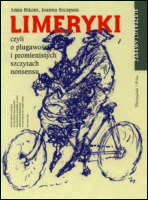
Limeryki, czyli o plugawo¶ci i promienistych szczytach nonsensu
(Limericks, or, On Ribaldry and Shiny Heights of Nonsense)Published by Prószyński i S-ka, Warszawa, 1998
Pretty good for starters. This is not much of a limerick collection, but more of a history of the gender in Poland. Of course, the book talks about English limericks, too. It quotes this one, for example, by John O'Tuomy (1706-1775), owner of an inn in Limerick, Ireland:
I sell the best brandy and sherryThe book (based on Lure of the Limerick by Baring-Gould and (mis)quoting from The Limerick by Legman) is almost a story about limerick as a gender. It reads very well. The authors list the most famous limerick writers, both Polish and foreign. Some of the best known English limericks are presented together with their numerous translations. Among them are the one about the lady in Riga (see above), together with seven Polish translations, and another very well known one, about the plumber of Leigh:
To make good customers merry;
But at times their finances
Run short, as it chances,
And then I feel very sad, very.
There was a young plumber of Leigh,This one, besides six Polish translations, has a French one, a German one, and even one in Latin.
Who was plumbing a girl by the sea.
She said, "Stop your plumbing,
There's somebody coming!"
Said the plumber, still plumbing, "It's me."
Next to canonical limericks, the authors have collected some "special cases", like
this graphical one, about a young fellow named Bliss.
(Nb. it's an example of a very good translation: not only is the idea
kept intact, even the key rhyme words are there!)
There's also a limerick in Czech, and one in Russian.
After one of the Polish limerick writers, the authors seem to have adopted
the assumption that limericks have to be dirty.
Well--we disagree. As explained in the introductory page (in Polish), we
have decided not to publish any limericks that cross the line between
frivolousness and ribaldry or obscenity.
Since it's really a storybook, the technical description of a limerick is hard
to find. Some major characteristics are given at the beginning, but some appear
much later into the book. The stories themselves, on the other hand, are truly
fascinating. Among them, the history behind The Limerical Lodge Of Admirers Of
Her Majesty Teresa Walas is given, and several limericks from Liber
Limericorum are quoted.
So, as of yet, we don't know the exact number of limericks published in
Limeryki... (the
publisher
says the number is 200.)
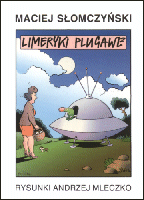
Limeryki plugawe
(Dirty Limericks)Published by Zielona Sowa, Warszawa, 1998
This is the guy who took it to himself that the limerick has to be dirty and obscene. Unfortunately, obscenities that replace wit (instead of supporting it) really bring the limerick down.
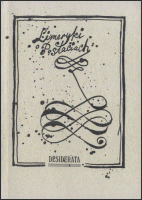
Limeryki o postaciach
(Limericks about People)Published by Desiderata, Warszawa, 1999
There's 71 of them, all about famous Poles. They very much resemble Clerihews, so maybe we should call them "Clerihmericks"?
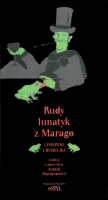
Rudy lunatyk z Marago
(A Red-haired Somnambulist of Marago)This is the best limerick anthology in Polish so far. Published by Twój Styl, Warszawa, 1999
The title is, of course, the first line of a limerick. Lots of them inside, all by Polish authors.
Illustrations by Andrzej Mleczko (the same guy who illustrated Limeryki Plugawe.)
